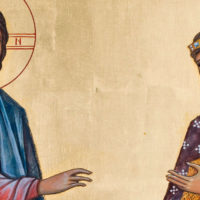Musical Meditation Piece before the sermon: ‘Thus spoke Zarathustra’, movement 1, by Richard Strauss
(The gospel for this Sunday veers off lectionary because of a family service on this day.)
Our Bible opens with a big bang: the story of how God created the world. We hear, “In the beginning, when God created the heavens and the earth, the earth was a formless void and darkness covered the face of the deep, while the Spirit – or breath – of God swept over the face of the waters. Then God said, ‘Let there be light,’ and there was light.”
Isn’t that an amazing image? Whenever I hear these words, I see the opening scene of the movie ‘2001 – A Space Odyssey’ in front of me: a black screen, where brilliant light slowly emerges behind a black orb as we hear the opening chords of Richard Strauss’ majestic first movement of ‘Und also sprach Zarathustra’ – Thus spoke Zarathustra. This dramatic piece, which we just heard, is loosely based on the book of the same name by Friedrich Nietzsche – a piece, which, quite coincidently, was written around the same time this congregation was founded, in 1895.
Strauss himself describes his piece just before the first performance in 1896 as follows: ‘First movement: Sunrise. Man feels power of God. Andante religioso.’ I think it’s the perfect description of what’s happening in the very beginning of creation.
This is how it all starts, and, as we know, God, the mighty creative force, the Spirit, the Breath, doesn’t stop there, but, with amazing ingenuity and imagination and plenty of playfulness, continues to make the universe, the earth, plants and animals of all kinds, among them human beings. And all this leads to the fateful words, ‘Be fruitful and multiply, and fill the earth and subdue it; and have dominion over…every living thing that moves upon the earth.’
So maybe not surprisingly, after the story of creation that open the Bible, the focus shifts from the grand scale of creation to those human beings God created. Adam and Eve failing to follow God’s rules and losing life in paradise. Cain murdering Abel. And this is just a cautionary and not very optimistic foretaste of human history to come. By the way, Strauss’ second movement of ‘Thus spoke Zarathustra’ is eerily reminiscent of this storyline. Strauss writes – and, just as a reminder, the last sentiment was ‘Andante religioso’: ‘But man still longs. He plunges into passion (second movement) and finds no peace.’
And this is basically what the Bible for the most part is about: man longs, plunges into passion and finds no peace. And in the course of all that, humanity, at least as described in the Bible, loses touch with the rest of creation – or at least takes it for granted. Indeed, much in the biblical books of the Psalms, Proverbs and the Prophets bemoan just that. But we still have those voices of praise and awe like we heard on today’s psalm, voices who acknowledge God’s mysterious hand behind everything created.
And the ancients were not totally ignorant about their environment: for example, they already realized that it is good to let a field lie fallow every seven years, so that the ground can rest and be replenished. It’s not that they were totally unaware that the use of the resources around them had to be mindfully managed. However, overall, I guess environmental issues were not as pressing or obvious in biblical times as they are today.
Which leads to the problem of finding a text in the gospels that references creation – other than human beings. But, thankfully, Jesus here and there uses images from nature to describe the relationship between God and humanity. For example, when Jesus describes God as a mother hen who fiercely protects her brood. Or compares us to sheep, who, under the care of God, the good shepherd, will not be lost forever. Or when Jesus uses the image of the lilies of the field and the birds under the air to describe God’s desire and power to provide for all creation.
And then, of course, we have the – here in the U.S. – very popular and, may I add, often misunderstood words from John 3:16: For God so loved the world – in fact, the original word used here is ‘cosmos’ – God so loved the world, the cosmos, the universe, everything created, that he gave his only Son. But more about that next Sunday…
God is the creator, the sustainer and sanctifier of everything.
So, are we to just praise God for the creation – but, at the same time, destroy it in the name of false gods like the economy (and, right now, we see how fickle this god is as we are facing a pandemic)? Do we go to the Louvre in Paris to get a glance of the Mona Lisa, admire it, and then throw acid at it? Think about it: we lament the destruction of amazing human made monuments all over the world, be it through war, willful malice, or accidents, like the fire that partly destroyed Notre Dame in Paris last year – because we acknowledge the beauty and majesty and cultural meaning of these creations. Why are we as the human race so disconnected from the greatest creation of all – the intricate web of life God has spun with so much ingenuity, imagination?
I was quite intrigued to find one possible answer in ‘Thus spokes Zarathustra’ – the book by Nietzsche and the music based on it. In his book, Nietzsche writes about the fictionalized figure of Zarathustra, who is extremely loosely based on a Persian philosopher of the 2nd millenium BC. This fictionalized Zarathustra preaches the necessity of the ascend of the ‘Übermensch’, literally the ‘over-human’, superhuman, a human being who strives to rid themselves of anything that would suggest that they are but another animal.
This ‘Superhuman’ consequently doesn’t need a god anymore – hence the line that Nietzsche is most famous for, ‘God is dead’. However, there’s a downside to the uppity superhuman: their disconnect from the earth, everything that’s below them, ‘down there’. And that includes fellow human beings who have not managed to become superhuman. Zarathustra, toward the end of his time on earth, is approached by others striving for the superhuman status, yet have gotten weary, and ask for his compassion. But Zarathustra sees this as a temptation to give into old human impulses – and denies the compassion he is asked for.
Let’s go back to Strauss and his musical interpretation of Nietzsche’s book. Here are his entire program notes for the world debut in 1896: “First movement: Sunrise. Man feels the power of God. Andante religioso. But man still longs. He plunges into passion (second movement) and finds no peace. He turns toward science, and tries in vain to solve life’s problems in a fugue (third movement)” – The agreeable dance tunes sound and he becomes an individual. His soul soars upward while the world sinks far below him.”
Talk about disconnect.
But of course we have a word for this disconnect in the Judeo-Christian tradition as well: sin. Often we talk about sins in the plural, transgressions, things we do wrong. But sin goes deeper. It starts with attitude. Sin in essence is being ‘curved into ourselves’, as Martin Luther famously said. We are revolving around our own universe with ourselves in the center, disconnected from the world around us, disconnected from creation, disconnected from our fellow human beings, disconnected from God. We lose compassion. We don’t really care except for ourselves. Instead of being human, we try to be superhuman somehow. Instead of grace and justification from God, we try to justify ourselves. And look down on everything and everybody we deem to be below us, be it people or our fellow creation.
Sin has been called a destructive force – and look at the state of creation right now.
Today is the first Sunday of the season of Lent – or ‘Passionszeit’ in German. And Lent traditionally is a time of reflection and fasting and penitence. Why would we need this times if everything between God and us just were hunky-dory?
Yes, we believe that Christ came to reconcile humanity with God in an outpouring of grace and forgiveness; that Jesus Christ, not a superhuman, but a true human being, fully God at the same time, full of compassion, reaches out to us and seeks to bridge the disconnect between God and humanity.
And Christ may be saying in today’s gospel lesson ‘Don’t worry.’ But that doesn’t mean we should just twiddle our thumbs and hope for the best outcome. Notice that Jesus says, ‘Don’t worry what YOU will eat or drink, or about your body, what YOU will wear. Is not life more than that?’ Life is much larger than just our limited part in it, and so Christ challenges us to connect with others with the attitude of love – that’s what Christ talks about when he talks about ‘having life abundantly’. We are to live out of the grace and share the grace that we have received so abundantly. God knows that’s a really hard thing for us.
But this is why we have a season like Lent: a time to look at things with honesty. A time to think about our attitudes. A time to ask for forgiveness. A time to have our hearts changed. A time to rediscover that we as human beings are part of this amazing creation, this intricate web of life spun by God, the source of all love, the unstoppable force of life. A time to reconnect and to be reconciled with the source of life and all life around us.
Picture by Kyle Cottrell on unsplash.com
This post is also available in: German




